- Home
- Lissa Evans
Crooked Heart Page 6
Crooked Heart Read online
Page 6
And on and on, diddly dee diddly dah, as Mattie would say. There was another small sheet of paper in the envelope, folded in half, his own name written on the outside.
He opened it at arm’s length, as if lighting a firework.
Dear Noel,
Just a ‘p.s.’ to say that we have received an overdue note from Queen’s Crescent Library for ‘The Roman Hat Mystery’ by Ellery Queen. Is it possible that you took it with you when you were evacuated? If so, could you return it, as we may otherwise be fined.
Yours affectionately
Auntie Margery and Uncle Geoffrey
The writing paper seemed to exude a faint smell of furniture polish, the same smell that had pervaded his aunt and uncle’s flat. Every surface there had been utterly clean, every loose object put away, so that if Noel left a book on his bed in the morning, it was re-shelved by the time he came in from school. A pencil on the floor, a notebook on the windowsill, a comb, a comic – even a fingernail clipping, left deliberately as a test – were whisked out of view, as if Auntie Margery were trying to pretend that Noel wasn’t there at all. He’d started to wonder whether that were actually the case, if he was really, truly living in the flat, or whether it was a dream of some kind. There had seemed no reason for the three of them to be in the same place; they were like random items found together in a junk shop: two gloves and a spigot, a fez and two spoons.
The school he’d been sent to was full of children who tried to walk straight through him and one morning it had occurred to him that he might actually be invisible. He’d stepped into the path of a cyclist, just to check; there’d been a scream of brakes and the bicycle had slewed sideways and thrown its rider into the gutter.
‘You really must try and be more observant, Noel,’ Uncle Geoffrey had said.
It was after that that Noel had made the decision to stop talking. He would speak (he’d decided) in the event of a fire or a bomb, but most other things could be covered by a nod, a shake of the head or a shrug. He had also discovered that if he pretended to go to his room, and then hid under the coat rack in the little entrance porch to the flat and covered himself with the folds of Uncle Geoffrey’s warden’s greatcoat, then he could hear everything that went on.
When the evacuation order came from the school, Auntie Margery had said, ‘Oh thank God, Geoffrey, because with the best will in the world I truly can’t bear another day of being stared at by that child.’
In the frowsty clutter of Vee’s kitchen, Noel looked at the letters again. He could almost see Uncle Geoffrey’s smile, lingering like the Cheshire Cat’s above the paper.
. . . since we are not yet his legal guardians . . .
He twisted the envelope and its contents into tapers, and burned them in the sink. Then he took the pad of writing paper that Vee had bought for her mother. It was not hard to imitate Vee’s uneven capitals and telegraphic style.
DEAR MR AND MRS OVERS
I AM VERY GLAD TO TAKE NOEL. HE IS SETTLING HERE AND AT SCHOOL VERY NICELY. DON’T WORRY ABOUT VISITING BECAUSE I THINK IT WOULD UNSETTLE HIM AT THE MOMENT SO NO NEED TO COME ALL THIS WAY. MAYBE NEARER XMAS. HE SENDS YOU HIS LOVE AND HOPES YOU ARE WELL.
HOPING THIS FINDS YOU WELL AS IT LEAVES ME
MRS V SEDGE
He posted it on the way to meet Vee, using a stamp that he found in the kitchen drawer. As it disappeared into the postbox he heard himself laugh. It was an odd sound, unpractised and staccato.
By the time Vee finished at Mrs Pilcher’s (‘Just one more little job, Mrs Sedge, it won’t take a moment’) it was twenty past one. She found Noel waiting exactly where she’d asked him to wait, on a bench at the south side of the abbey, beside the memorial to the Great War. He didn’t move or speak as she approached, only watched her with that flat, judgemental gaze. Thou God, seest me, she thought; it had been the text on the wall in the outside lav when she was a girl, and it always made her think of carbolic, and drains.
‘Did you wake Donald up?’ she asked, and he nodded.
‘And did he say where he was going?’ she asked. He shook his head. The fingermark on his cheek had faded to a shapeless blotch.
She took a ginger snap out of her bag and held it out to him. ‘Mrs Pilcher baked these, you can have one. Only you need to limp,’ she said. Noel stared at her, open-mouthed. ‘Because of your bad leg,’ she added. ‘And if I talk to anyone you’re not to say anything at all. Understand?’ He nodded, and inserted the biscuit without thanks.
‘Come along, then,’ she said.
He limped steadily. On the Watford platform at Abbey station, they bumped into Mrs Farrell, the butcher’s wife, and Vee was able to say, as planned, ‘I’m just taking my little evacuee to his hospital appointment to have a leg iron fitted. Have to look after their health, don’t we?’ and Mrs Farrell had acknowledged Vee with a tiny, icy nod, which was at least better than her usual habit of cutting her dead.
‘I have to do something in Watford,’ Vee said to Noel, as they stood together in the train corridor. The carriages were full of soldiers, as usual. ‘Business. Door to door.’
Watford was big enough, she’d decided. There’d be no danger of meeting anyone she knew. She was wearing her good slate-grey coat and a hat that nearly matched, and a gilt pin she’d found on the pavement outside chapel one Sunday morning. It had a dot of red enamel in the centre, and looked vaguely official if you didn’t peer too closely.
Noel didn’t ask any questions, and when they got off the train, twenty minutes later, he hobbled after her without reminder.
It was as they walked out of the station that she began to get nervous. Ideas fluttered through her head. She thought about trying the row of houses opposite the entrance, and then decided that they were too public. She thought about taking a bus to the bigger houses in the suburbs. She walked past a row of shops, turned into the first street she came to, caught the eye of an old lady who was washing her windows, hesitated, started to search around in her bag for the collecting box and then lost her nerve and did a quick about-turn, treading on Noel’s foot in the process.
‘Out of the way,’ she said, and then ‘sorry’. Her heart was stuttering like a road-drill. She stopped by a draper’s to catch her breath, and eyed the display of silk-effect blouses in the window. The pink one was the colour of calamine lotion. She could feel Noel looking at her and she began to wish she hadn’t brought him; the intensity of his stare was giving her the jitters. Until she knew what she was doing, until she’d got the hang of it, she’d rather not have a witness.
At the corner of the next street, she pointed to a low wall.
‘Sit there till I come back.’ He sat, his gaze still upon her, and she turned and walked rapidly away.
There was no one in at the first house, and at the second, the door was answered by a child.
‘Is your mother in, dear?’ asked Vee. The girl disappeared without a word, leaving the door ajar. Vee took the collecting box out of her bag. It was borrowed from the Sunday School cupboard at Bethesda; she’d covered up the writing on the side with a picture of an aeroplane that she’d cut out of an illustrated paper.
‘Yes?’ said the woman, not opening the door further, but sliding sideways into the gap. She was a shrunken little thing – Vee’s age, but with a withered, papery complexion. From within the house came a steady shrieking.
‘Spitfire Fund,’ said Vee, giving the box a silent shake. It came to her, too late, that she should have primed it with a few coppers.
The woman nodded, and closed the door. Vee waited, uneasily. A minute went by. Should she stay? Should she try next door? Should she run? It wasn’t the sort of house that would have a telephone, but might the child have climbed over the back wall, and be racing to call the police? She was just turning to leave when the door reopened to reveal the girl with her fist outstretched.
‘Mum says to give you this,’ she said, and dropped a sixpence into the slot.
The door closed again.
The rattle
of silver on wood seemed to linger in the air; Vee thought she had never heard a sweeter sound. Sixpence. Sixpence. The ease of it – she had knocked on a door and a child had given her money. It had the jingling simplicity of a nursery rhyme. She seemed to float along the pavement towards the next house.
‘Spitfire Fund,’ she said to the woman who answered the door.
‘What’s happened to Edna?’ asked the woman.
‘Who?’
‘Edna Cleverley who does the Spitfire collection.’
‘Hurt her foot,’ said Vee, randomly.
‘How?’
She hesitated. ‘Tripped over a dog?’
The woman frowned. ‘She doesn’t have a dog.’
Leave now, ordered a voice in Vee’s head. ‘Next door’s dog,’ she heard herself saying.
‘The collie?’
‘That’s right.’ A miracle. Vee smiled breezily and rattled the box.
The woman shook her head. ‘I gave something last month,’ she said, and closed the door with a hint of a slam.
Vee glanced in the direction of Noel. He was staring directly at her. She skipped a couple of houses, for no reason other than nerves, and swung the knocker of the third.
Another child answered, a thick-set boy this time, with pink cheeks and a scornful mouth.
‘Spitfire Fund,’ said Vee.
‘That’s not a Spitfire.’
‘What isn’t?’
‘On the box. It’s a Wellington.’
‘Is it?’ She peered at the picture. ‘Well, it doesn’t matter.’
‘I’d like to see you try to fight a Messerschmitt with a Wellington,’ he said. ‘It’d matter then all right.’
She gave the box a shake.
‘Haven’t collected much, have you?’ he asked. ‘What you got in there, a button?’
‘Can I speak to your mother?’
‘She’s not in.’
‘Why aren’t you at school?’
‘None of your business.’
‘You’ve got a cheek, speaking to me like that.’
‘You gonna stop me?’
‘Somebody damn well ought to.’
The boy turned his head. ‘Dad!’ he shouted, up the hall. Vee started to walk very quickly back along the road, her best shoes rubbing.
‘Come on,’ she called to Noel before she reached him. She dared a look back before she turned the corner and the boy was gone, the door closed; he’d been codding her. She sat on the wall to catch her breath.
Noel had already stood up, and remained standing as Vee slipped off a shoe and rubbed her heel. Distantly, a church clock struck the half hour. The last time she’d been in Watford, there’d been plenty of motor traffic, but nowadays the roads were nearly all empty, and it was as quiet as a village. She could hear someone scrubbing a pavement. And sparrows bickering. And a man shouting, ‘Oi, you! You on the wall there! Did you just swear at my boy?’
She rammed the shoe back on, and started running. She could hear Noel peg-legging along behind her. A bus was coming up the road and she reached the stop and waved a hand, and scrambled on board while it was still moving and Noel jumped up beside her, limp momentarily forgotten. There was the faintest flush of pink in his cheeks.
‘I need to try another place,’ said Vee.
She took a seat, and peered between the strips of grimy tape on the window. Larger houses, she thought: the sort of places where the kiddies would be away at boarding school.
It was important to have a plan.
When they got off the bus again seven stops later, Vee took a newspaper out of her bag. ‘Here,’ she said. ‘Mrs Pilcher gave me last week’s Advertiser. There’s a Children’s Corner in it, competitions and suchlike. You can read it while you’re waiting.’ She nodded at the bench beside the bus stop. After a long moment, Noel reached out his hand for the paper. He watched Vee walk away along Linden Avenue, grey coat, grey hat, her head twitching to and fro as she inspected the houses on either side of the road. The first time he’d ever seen her he’d thought of a magpie, but now she seemed more like a pigeon, drab and directionless, pecking at anything that looked as if it might be edible. At one point, she paused to crane over a laurel hedge; at another she started to open a gate, and then closed it again hastily. It was obvious that she was doing something that she ought not to be doing. He felt a little tug of curiosity; it had been a long time since he’d last felt that.
Vee dwindled into the distance.
The front page of the Herts Advertiser was all fine print; scores of tiny advertisements for accommodation, lodgers, help wanted. Lady Fremantle recommends her useful maid; good needlewoman, fond of dogs.
He turned the pages, his gaze bumping across the columns, snagging the odd line: A fine of 5s was imposed on Alfred Field of 27, Cravells Road, Harpenden, at St Albans Divisional Sessions on Saturday, for driving a horse and cart without front lights. Reading felt effortful. It was odd to think that for years he had sucked up print without thinking. Since leaving Mattie’s house, he hadn’t finished a book. He couldn’t follow a plot any more, the meaning seemed to bypass his brain, or else stuck to it briefly and then fell off when he turned the page, like an inadequately licked stamp.
Children’s Corner. How to make a useful and decorative letter rack. Take an old picture frame, approximately 12" by 8". You will also need scissors, drawing pins, an old newspaper, poster paints, glue or paste, a brush, a pot of clear varnish . . .
Without books, he’d had no way of making the time pass quickly. The hours at his aunt and uncle’s house had stretched like knicker elastic. He had done mental arithmetic, or played ludo against himself, rotating the board between each go. And he had written a diary in code, updating it every quarter of an hour. 9.15 Auntie Margery is making an apple pie. 9.30 Auntie Margery is sweeping the kitchen floor. 9.45 Auntie Margery is washing dishcloths. 10.00 Auntie Margery has just looked up at me and sighed. Uncle Geoffrey had removed the diary, and given him a wall-map instead, with a box of red glass-headed pins, so he could mark the advance of the British Expeditionary Force in Europe. And then Germany had invaded Belgium and France and all the pins had gone tinkling back into the box again.
The sum of £96 4s 1d was raised as a result of the house-to-house collection taken recently in aid of Red Cross Parcels for British Prisoners of War. Mrs Freda Lambert, chairman of the Harpenden and District Branch of the Red Cross, stated, ‘We have been delighted by the unstinting generosity shown by Harpenden householders towards such a worthy cause.’
Noel read the paragraph a second time. He felt as if someone had just reached into his head and given his brain a sharp pinch. Holmes would have put down his violin at this point; Sam Spade would have reached for his gun. Noel snapped the paper shut and looked along the road. A hundred yards away, Vee was talking to someone, her head bobbing nervously.
She could hardly believe it. Here she was, at the swanky end of Watford, standing outside a house that had to be worth hundreds of pounds, and the owner had not only refused to hand over a single penny, but had actually followed her up the garden path and on to the pavement and was giving her a lecture on communism. She couldn’t grasp the half of what he was saying. He had a long face with a mouth like a letter box, and leaflets kept shooting out of it. Ribbentrop–Molotov Pact. Imperialism on Both Sides. The Worker Betrayed. Words rattled past her ears. He was scarcely looking at her; it was as if she were the front row of a vast audience.
She edged away, lowering the collecting box. A few coins slithered around inside – three or four bob at most, a rotten profit for a whole afternoon. Take out the cost of the train and the bus, and the strain on her nerves, and it wasn’t worth it. Another plan kaput.
The mouth carried on moving. Struggle on Two Fronts. Spectre of Capitalism. Government Lackeys. Something moved beside her, and she turned to see Noel, blank-faced at her elbow.
‘Oh, it’s my little lad,’ she said, gratefully. ‘He’s been waiting for me like ever such a good boy. I’d
better take him home to his tea, hadn’t I?’
‘And when they come and march him off to the front, perhaps you’ll reconsider,’ said the man. ‘With the financial support of people like yourself, the capitalist-engineered armed conflict will be eternal.’
‘Yes,’ said Noel, ‘isn’t it strange that there’s always enough money in the coffers for a war?’
In the pause that followed, Vee seized the boy’s hand and dragged him away along the road.
‘I think that chap had a screw loose,’ she remarked, as they waited for the bus, ‘though he’s right that the war’s a racket, they’re all on the make. That’s what Donald says as well. Sir Winston Chiseller, he calls him.’
Noel was looking at the collecting box in her hand. The picture of the aeroplane was starting to peel off, the words Heathen Mission clearly visible beneath.
‘How much did you collect?’ he asked.
‘What?’ Vee twisted round to look at him.
‘How much money did you actually get?’
‘Never you mind.’ She put the box in her bag. ‘Here’s the bus coming,’ she said, brightly, ‘we’ll soon be home.’
Noel spoke again. ‘Because the house-to-house collection for Red Cross Parcels in Harpenden raised over ninety-six pounds.’
‘How much?’ She turned, her arm still stuck out to signal the bus.
‘Ninety-six pounds, four shillings and a penny.’
‘Ninety-six! ’
‘I expect they had quite a few collectors though, not just one.’
‘Yes, but even so, that’s a . . . a . . .’ With an effort, Vee remembered what she ought to be saying. ‘There are a lot of people collecting for Spitfires as well,’ she said. ‘Lots and lots of us.’

 V for Victory
V for Victory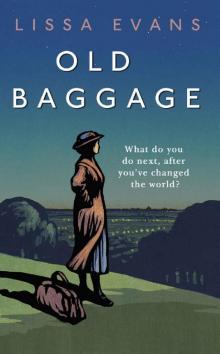 Old Baggage
Old Baggage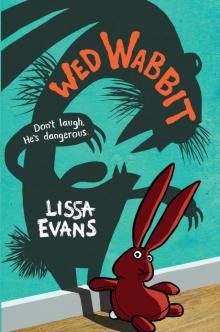 Wed Wabbit
Wed Wabbit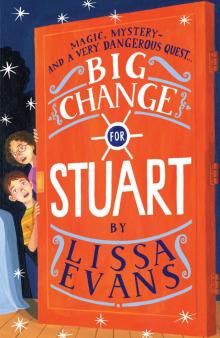 Big Change for Stuart
Big Change for Stuart Spencer's List
Spencer's List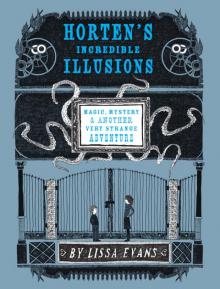 Horten's Incredible Illusions
Horten's Incredible Illusions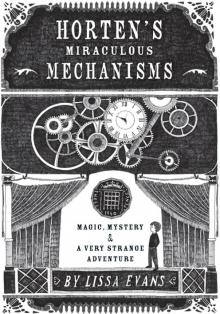 Horten's Miraculous Mechanisms
Horten's Miraculous Mechanisms Their Finest Hour and a Half
Their Finest Hour and a Half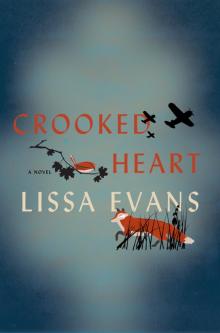 Crooked Heart
Crooked Heart